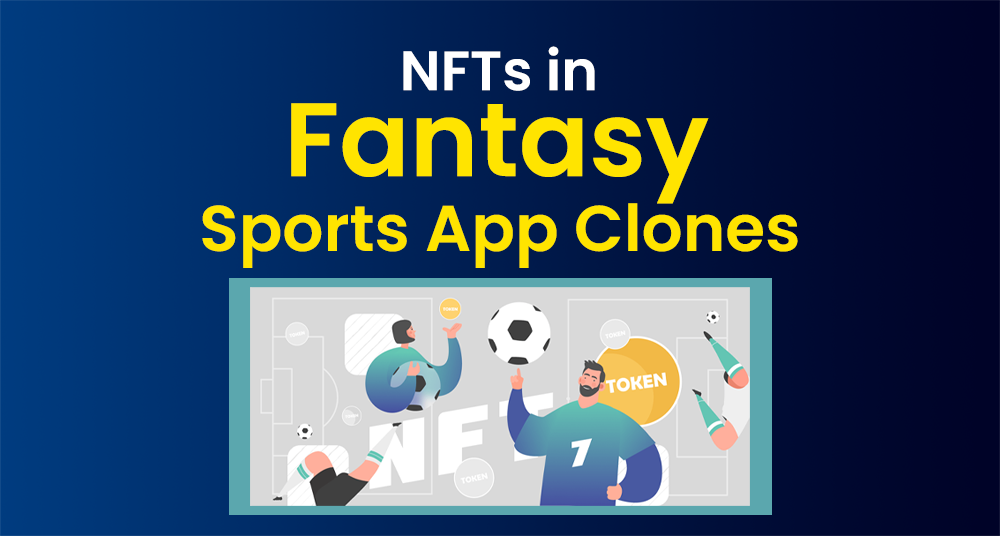In the ever-evolving digital world, the intersection of gaming, collectibles, and blockchain technology has given rise to Non-Fungible Tokens (NFTs). These unique digital assets have not only transformed the art and entertainment industries but are also starting to make their mark on the gaming world. One particularly exciting development is the integration of NFTs into fantasy sports apps, especially those built as clones of popular platforms. This article delves into the impact of NFTs in fantasy sports app development, exploring the future possibilities and challenges, key components of NFTs in this space, and offering insights into how NFTs could revolutionize the way fantasy sports are played and experienced.
What are NFTs?
Non-Fungible Tokens (NFTs) are a type of digital asset based on blockchain technology, often used to represent ownership of a unique item, digital or physical. Unlike cryptocurrencies such as Bitcoin or Ethereum, which are interchangeable and identical to each other, NFTs are distinct and cannot be exchanged on a one-to-one basis. Each NFT has its own unique metadata, ensuring that it stands apart from any other token.
NFTs can represent various types of digital goods, such as artwork, music, videos, and, increasingly, in-game assets like skins, characters, and other collectibles. They are usually bought, sold, or traded on NFT marketplaces, where ownership is tracked and verified on the blockchain. NFTs have gained popularity in recent years, largely due to their ability to provide verifiable proof of ownership and scarcity, thus adding value to the digital world.
The Role of NFTs in Fantasy Sports Apps
Fantasy sports are digital platforms where users create fantasy teams using real-life athletes. Points are awarded based on the athletes’ real-world performance. The success of fantasy sports platforms, such as ESPN Fantasy Sports, Yahoo Fantasy, and FanDuel, has paved the way for clones of these apps to emerge in the marketplace. Fantasy sports app clones offer similar features, allowing users to create teams, trade players, and participate in leagues.
By integrating NFTs into these clones, app developers are able to introduce a new layer of innovation and engagement. Here are some of the ways NFTs are impacting fantasy sports app clones:
Tokenization of Players
In traditional fantasy sports, participants select real-world players for their teams. However, by utilizing NFTs, these players can be tokenized into unique digital assets. Instead of simply selecting a player’s name, users can own the actual NFT representing that player. These player NFTs could be traded or sold in a peer-to-peer marketplace, adding an additional layer of excitement to the game.
The value of a player NFT would fluctuate based on their real-world performance, just as a player’s fantasy points do in traditional fantasy sports. For example, if a player performs exceptionally well in a game, their NFT might increase in value, offering a financial incentive for fantasy managers. Conversely, a poorly performing player’s NFT would lose value, offering a risk-and-reward dynamic to team management.
Unlocking Rare and Unique Assets
NFTs are often used to represent rare or limited-edition assets. In the context of fantasy sports, this could mean creating rare player cards or even special team-related assets that can only be earned or purchased through the app. These rare NFTs could offer unique abilities or advantages within the app, such as access to exclusive leagues, special performance boosts, or special merchandise tied to a fantasy player or team.
For example, a limited-edition NFT of a top-performing player could be awarded to users who reach certain milestones or achieve specific feats within the game. Players would then have the option to trade, sell, or hold onto these rare NFTs, further enhancing the in-game economy.
Enhanced Player Interaction and Engagement
The integration of NFTs into fantasy sports apps can provide new ways for users to interact with the game. Players might earn or acquire NFT items that they can use to enhance their teams or gain advantages in competitions. Additionally, the ability to trade and sell these NFTs fosters a deeper level of engagement, as users seek to improve their teams and build valuable collections of digital assets.
In app clones, this can create a new social experience, where users can discuss strategies, share rare player NFTs, or even compete to see who can build the most valuable fantasy roster based on player NFTs. These social aspects can contribute to increased app retention and player involvement.
Gamifying the Fantasy Sports Experience
The traditional fantasy sports model revolves around creating teams, making trades, and earning points based on real-world performances. However, by integrating NFTs, developers can gamify the experience even further. For instance, fantasy sports app clones could introduce special challenges, quests, or events that reward players with exclusive NFT assets upon completion. This could drive engagement and increase the excitement of participating in fantasy sports leagues.
Moreover, NFTs could be used to create achievement systems, where users earn badges or rewards in the form of unique NFTs that signify their success. For instance, a user who finishes first in their league could receive a rare “champion” NFT that holds value and can be displayed as a badge of honor.
Future Possibilities and Challenges
The integration of NFTs into fantasy sports app clones offers immense potential for growth and innovation. However, several challenges must be addressed before NFTs can become a standard feature of fantasy sports platforms.
Future Possibilities
- Deeper Integration with Blockchain: As blockchain technology continues to evolve, the possibilities for integrating NFTs into fantasy sports apps will expand. Blockchain could allow for secure and transparent transactions, allowing players to buy, sell, or trade NFTs with ease. In the future, fantasy sports platforms may be fully decentralized, offering players greater control over their assets.
- Cross-Platform Interoperability: One of the most exciting possibilities is the idea of interoperability between different fantasy sports platforms. As NFTs can exist across multiple blockchains, users may be able to carry their player NFTs from one fantasy sports app to another. This cross-platform integration could lead to the creation of large, interconnected fantasy sports ecosystems where assets can be traded seamlessly across platforms.
- Esports Integration: Esports is rapidly growing in popularity, and fantasy sports apps are beginning to integrate esports into their offerings. With NFTs, users could build fantasy teams based on their favorite esports players, allowing for a new realm of competition and engagement.
- Player Ownership Rights: In the future, NFTs might not only represent virtual goods but could offer players ownership rights or voting rights within the fantasy sports app. This would allow players to have a say in the governance or rules of the fantasy sports platform, creating a more decentralized and community-driven experience.
Challenges
- Regulatory Issues: One of the main challenges surrounding NFTs is the lack of clear regulatory frameworks. As fantasy sports apps operate in various regions with different laws, integrating NFTs could raise issues related to gambling laws, taxes, and digital asset regulations. Ensuring compliance with local laws is critical for the widespread adoption of NFTs in fantasy sports apps.
- Environmental Concerns: The environmental impact of blockchain technology, especially energy-intensive proof-of-work blockchains like Ethereum, is a common concern. As NFTs are often minted and traded on such blockchains, the environmental footprint of integrating NFTs into fantasy sports apps could deter eco-conscious users. The growing shift to energy-efficient blockchains and Layer 2 solutions may alleviate some of these concerns.
- Market Volatility: NFTs are highly speculative assets, and their value can fluctuate dramatically based on trends and market sentiment. For fantasy sports app users, this volatility may lead to frustration or confusion, especially if the value of player NFTs becomes overly speculative. Balancing the NFT economy with a stable in-game economy will be essential to maintaining user satisfaction.
- Adoption Barriers: While NFTs are becoming more mainstream, many fantasy sports players are still unfamiliar with blockchain technology. Educating users on how NFTs work and how they can enhance their gaming experience will be crucial for widespread adoption. Additionally, the need for cryptocurrency wallets and the technical know-how required to interact with NFTs might be a barrier to entry for some users.
Key Components of NFTs in Fantasy Sports Apps
For NFTs to thrive in fantasy sports app, several key components need to be in place:
Blockchain Platform
A robust and secure blockchain platform is essential to support the minting, trading, and storing of NFTs. Popular blockchain networks like Ethereum, Flow, and Polygon are currently being explored for such applications.
NFT Marketplace
An in-app marketplace where users can buy, sell, and trade NFTs is crucial for creating a thriving ecosystem. This marketplace should be easy to use and offer a seamless experience for trading digital assets.
User Education
Educating users on the value of NFTs, how to trade them, and their potential benefits within the app will help ensure that players can fully enjoy the new features and innovations NFTs bring.
Smart Contracts
Smart contracts are essential for automating the process of trading, buying, and selling NFTs. These contracts can help streamline transactions and ensure they are secure and transparent.
Final Thoughts
The integration of NFTs into fantasy sports app has the potential to transform the gaming experience. By allowing players to own, trade, and interact with digital assets, NFTs can introduce new layers of excitement, engagement, and value to fantasy sports. However, as with any new technology, there are challenges to overcome, including regulatory concerns, market volatility, and user adoption barriers. With the right infrastructure and user education, NFTs could redefine the future of fantasy sports, offering a more immersive, dynamic, and rewarding experience for players. The possibilities are endless, and as the technology continues to evolve, the future of fantasy sports apps may be more decentralized and interactive than ever before.



